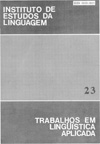Resumo
The main goal of this paper is an attempt to answer a basic question: is it possible to systematize a deconstructive, postmodern perspective for the translator's task in a pedagogical model that is be universally applicable in the disciplines of translation practice offered in some of our Universities? In other words, and in more general terms, is the postmodern reflection amenable to a general systematization? As I intend to argue, the main characteristies of the reflection that is usually labelled as "postmodern" (here represented, for instance, by the work of Jean-François Lyotard) will not lead us to a pedagogical "model", but to an "anti-model", at the center of which we will find the teacher's awareness that there os no "metanarrative" to mask the struggle for power which motivates any enterprise, including the intellectual pursuit that constitutes the teaching project. From such a perspective, the main goal of any teaching project would be the desconstruction of its own strategies and motivations. Instead of merely "protecting" and "transmitting" a supposedly "neutral" and stable body of knowledge, a postmodern teacher would ttempt to expose the power struggles that underline the relationships established in the very classroom where she teaches and where her "textual authorit" is exercised. To the teacher of translation, such a pedagogy would bring the awareness that, instead of attenpting to instructteach his students in the impossible pursuit of the absolutely "correct" translation, however what he should be doing is trying to empower these students with the means to learn that which makes a translation particularly sucessful in the cultural cmmunities where they intend to be working, at the same time that he simulates them to reflect on (and to act upon) the political implications and constraints of the very profession they have chosen.O periódico Trabalhos em Linguística Aplicada utiliza a licença do Creative Commons (CC), preservando assim, a integridade dos artigos em ambiente de acesso aberto, em que:
- A publicação se reserva o direito de efetuar, nos originais, alterações de ordem normativa, ortográfica e gramatical, com vistas a manter o padrão culto da língua, respeitando, porém, o estilo dos autores;
- Os originais não serão devolvidos aos autores;
- Os autores mantêm os direitos totais sobre seus trabalhos publicados na Trabalhos de Linguística Aplicada, ficando sua reimpressão total ou parcial, depósito ou republicação sujeita à indicação de primeira publicação na revista, por meio da licença CC-BY;
- Deve ser consignada a fonte de publicação original;
- As opiniões emitidas pelos autores dos artigos são de sua exclusiva responsabilidade.
Downloads
Não há dados estatísticos.

